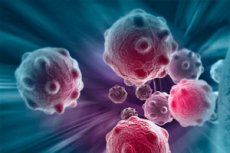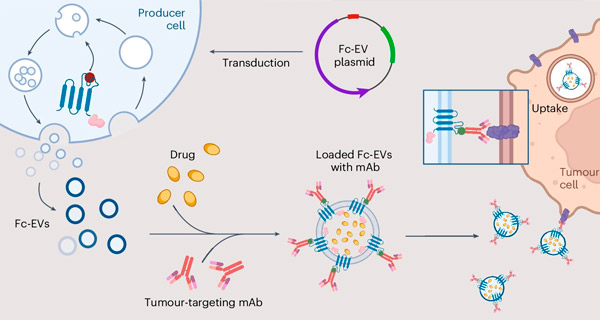New publications
Antibody-driven exosomes for targeted cancer therapy
Last reviewed: 02.07.2025

All iLive content is medically reviewed or fact checked to ensure as much factual accuracy as possible.
We have strict sourcing guidelines and only link to reputable media sites, academic research institutions and, whenever possible, medically peer reviewed studies. Note that the numbers in parentheses ([1], [2], etc.) are clickable links to these studies.
If you feel that any of our content is inaccurate, out-of-date, or otherwise questionable, please select it and press Ctrl + Enter.

Researchers at the Karolinska Institute in Sweden have been able to deliver a targeted cancer treatment using small membrane vesicles that cells use to communicate. The study, "Antibody-loaded exosomes for targeted cancer therapy," published in the journal Nature Biomedical Engineering, shows that the treatment reduces tumor growth and improves survival in mice.
When our cells communicate, they send out small membrane bubbles known as extracellular vesicles, which contain various signaling molecules. Interest in these tiny bubbles, sometimes called our body's "message in a bottle," has increased in recent years because they could be used to deliver drugs.
Antibodies target tumors
Researchers at the Karolinska Institutet have created a targeted cancer treatment by loading these bubbles with a chemotherapy drug and attaching tumor-targeting antibodies to their surface. In addition to targeting tumor cells, the antibodies also act as a form of immunotherapy, enhancing the therapeutic effect. The treatment reduced tumor growth and improved survival when administered to mice with breast cancer or melanoma.
"By attaching different antibodies to extracellular vesicles, we can target them to almost any tissue and load them with other types of drugs," says Oskar Wiklander, a physician and researcher in the Department of Laboratory Medicine at Karolinska Institutet and one of the first authors of the study together with Doste Mamand, a researcher in the same department. "The treatment could thus be used against other diseases and types of cancer."

Engineering cells to produce vesicles with an antibody-binding motif specific to the Fc domain. Source: Nature Biomedical Engineering (2024). DOI: 10.1038/s41551-024-01214-6
More effective treatment with fewer side effects
The hope is that the new treatment will be more specific and effective in killing tumor cells while sparing healthy tissue than current treatment strategies. The researchers plan to study whether different combinations of antibodies and drugs can further improve treatment.
"In particular, we want to investigate the possibility of delivering mRNA as an anti-cancer drug," says the study's last author, Samir El Andaloussi, a professor in the Department of Laboratory Medicine at Karolinska Institutet.
"Ultimately, we hope this will lead to a new treatment platform that can improve treatment efficacy and reduce side effects in difficult-to-treat diseases, especially cancer."
